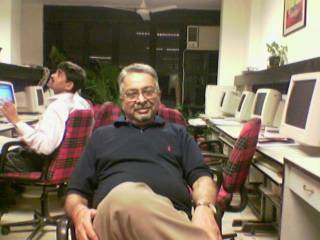
Habits die hard. I just can’t sleep beyond 4 a.m. Indian Standard Time. Come what may, I have to get out of bed. Even if my biological clock malfunctions, Zack will act as my alarm by licking my face and jumping all over. Because it is time for its morning ablutions! Zack, by the way, is my one year old Lhasa Apso male – a gift to my daughter by her friends.
Be it Delhi, Muscat or Bahrain (where I am now on a short visit), the alarm went off at 4 a.m. IST! Considering Bahrain is two-and-a-half hours behind, I woke up at 1.30 a.m.! That’s the time the night life is coming to an end and the Central Manama cabbies are doing roaring business ferrying inebriated souls – nay, bloated tummies – of all nationalities. Lot of noise and honking of horns.
Got into my Bermudas and T-shirt and stepped out of Delmon International to peek at the chaotic scenario on the roads. Reminded me of my Bombay days in the 1980s. Even at 1.30 in the morning, the city used to be very active. I had taken a Victoria ride at that unearthly hour on the Diamond necklace part of Chowpatty. Even did a 1000 word feature ‘A night outside Churchgate’ for the now-defunct The Indian Post (1988)!
The janitor looked at me curiously and enquired “all well?”. I responded with a smile and did a short detour for 5 minutes before I felt it was mad to go for the one hour walk and returned to room.
Since I could not – and did not – get into the lap of Dame Sleep, began reading an article in Esquire, November 2007 issue on why one should not ignore reading Harry Potter series. It may be trash, but it is going to be the defining moment as today’s kids who devour HP get into the hotseats in government and corporate and begin talking HP as the reference point. If you and I have no clue as to the characters and plot of HP series, we are a gone case. Must pick up HP soon!
Time flew fast as the The Most Sexiest Woman Alive cover story in Esquire kept me buuuuuuuuussssssssy! Read the online version at www.esquire.com. Very unusual treatment for a cover story of even this nature! Honestly, I did not like it a wee bit. But, it is Esquire. How can you ignore?
Sharp 4 a.m. Bahrain local time, I stepped out again. It was windy. Bit cold. Cabbies chased me to know whether I need a ride. I did not. They moved away. There was a lot of activity on the roads. Bulldozers, excavators were moving towards I don’t know where. Maybe for some construction site. Lot of Indian, Pakistani labourers in company clothes were rushing with a plastic bag containing food, I presume. Nearby Bus Terminal wore a festive atmosphere with lot of talk, tobacco smoke, chattering of Hindi, Malayalam, Telugu etc.
Buses were slowly creeping in to disgorge people from various parts. Roadside restaurants were serving piping hot black tea in tall glass containers. Many Bahrainis were engaged in eating huge Pakistani type rotis with side dishes and a lot of green salad. Even some Indians and Paksitanis were having their breakfast at 4 a.m.! Maybe they may not get time before noon to eat.
Uniformed Manama Municipality workers have begun their day sweeping roads filled up with muck and throwaways. Shops owned by Keralities were opened already and rushing workers were picking up some cookies and beedis/cigarettes.
As I moved into the King Faisal Causeway, the main thoroughfare connecting Bahrain with Saudi Arabia, I could not miss the inky blue sky. The red lights positioned strategically at various levels on the huge twin towers of Bahrain Financial Harbour were winking at some unknown angels. The traffic on the road was incessant. Who are they and where are they going, I could not fathom. A few young Indians were jogging merrily in propah branded attire.
I quietly moved into a Bahraini type roadside restaurant for a cup of tea. Of course, it was manned by whoelse but our own kith and kin from Kerala! It was packed at 5.15 a.m. The elderly Karimbhai – from Talacherry – took my order and returned in double quick time. His Arabic was fluent and Hindi was no less. Could not help engage him a bit of conversation. He came 30 years ago and visits home every two years. ‘Life has been nice,’ he replies in between serving customers. ‘Are you from Kerala?’ he asks earnestly. I say, ‘no’ but from Chennai. Immediately he responds with his recollection of Madras which he has visited 40 years ago!
By the time I return to room, the wristwatch shows 5.30 a.m. I could not help compare my early mornings in Muscat. There again I wake up at 4 a.m. and go for a walk upto Wadi Kabir round about and return to Star Cinema, take a u-turn to come back to Ruwi guest house. All in a span of 75 minutes. This includes a stopover at Oman Oil petrol pump for a hot cuppa or the Shell Select on the same stretch.
There is very little life or activity on Muscat roads at 4 a.m. Barring a few heavy duty trucks and a sporadic cars moving at fast clip, I don’t witness human activity. Occasionally, see kids play football on the open grounds before Star cinema.
Bahrain is different, no doubt. More life in early mornings. Like Delhi.
Cheers



